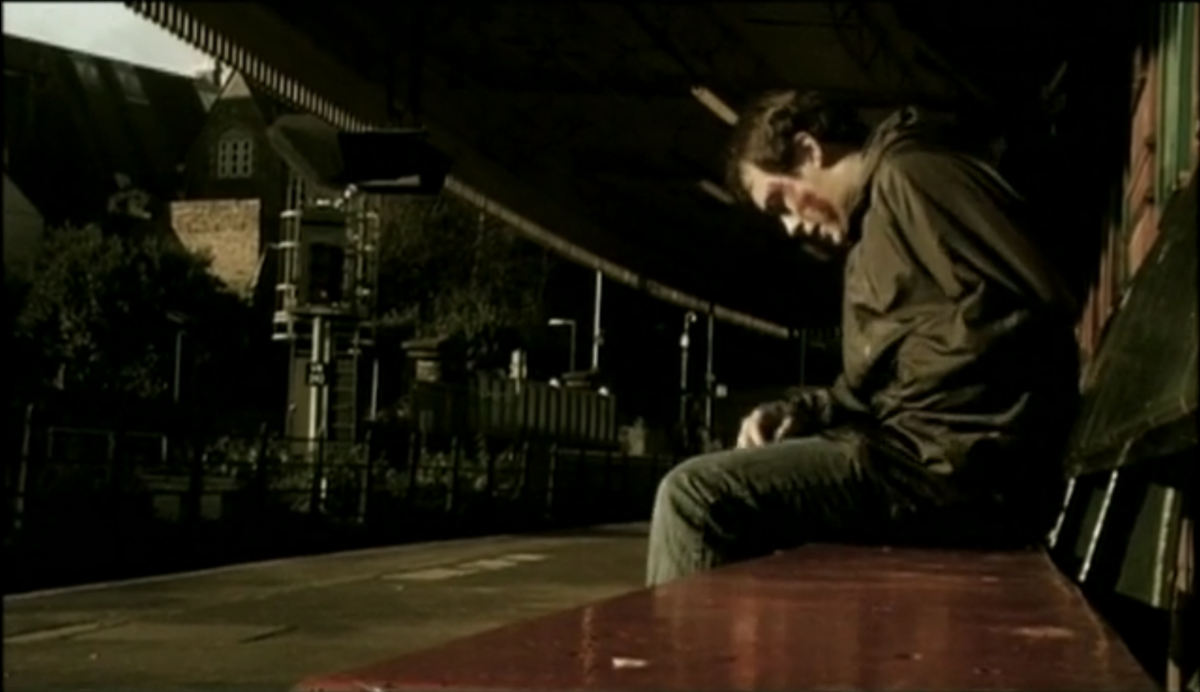Once upon a time... in Cardiff
So: at some point next year, Gareth Evans’ sixth feature as director, Havoc, is due to drop on Netflix, and it is, by some margin, my most anticipated film of 2024.
That’s in spite of it lacking a trailer, a firm release date, or even much in the way of details about its plot or its production. Netflix continues to be a poisoned chalice for filmmakers who sign on with them; over 200 million users get instant access to your work, but before and after the 2 weeks or so when it might get featured on the main page, the service will treat it as just another undifferentiated drop of content in its ever-flowing content hose.
So, in the absence of stills or interviews or behind-the-scenes footage to salivate over ahead of Havoc‘s release, I thought I’d try filling up the time with something slightly more productive; a comprehensive retrospective of Evans’ filmography, examining where he started; how he developed; how he got to be a filmmaker whose work I’ve followed closely for over 13 years now, and probably my favourite contemporary genre director. I’ll try and make a project of it; something a bit more rigorous and academic than the rambling splurge of half-baked first impressions and swearing that make up my usual diary entries.
Evans rose to international prominence off the back of the work he did in Indonesia between 2009 and 2014, but he got his start in his native Wales. After graduating with an MA in screenwriting from the University of Glamorgan, in 2003 he released his first film made in a professional capacity under the aegis of Random Films. This was a 21-minute short entitled Samurai Monogatari, a chanbara pastiche filmed in black-and-white and in Japanese, featuring Japanese actors. If it’s available to watch nowadays, I’ve not been able to find it, though I did come across an interview from 2004 with Snowblood Apple that provides some insights into the beginning of his career.

He namedrops several Japanese filmmakers, in particular Akira Kurosawa, Takeshi Kitano, and Takashi Miike. There are a few things to take from this. First of all, Evans is a film nerd before he’s anything else. He’s someone who sat up late into the night in his time at university, poring over Asian genre films, watching for what makes them tick. He’s a pastiche artist, someone who loves movies and the processes that go into making them, and someone for whom the act of making movies is about paying that inspiration forward.
[Evans is] a pastiche artist, someone who loves movies and the processes that go into making them, and someone for whom the act of making movies is about paying that inspiration forward.
Second of all, he’s a guy who appreciates both the high-brow and the low-brow, and especially appreciates the spaces where they intersect. Chanbara is a genre that’s particularly fecund in that respect; this is the generic umbrella under which you can fit everything from Ran to The Sword of Doom to Lone Wolf and Cub to Azumi. There’s a lot of art, and a lot of schlock, and Evans’ subsequent career would prove that he’s interested in both.
That brings us to Footsteps, his first feature (and, seven paragraphs in, nominally the subject of this review). It’s a microbudget, character-focused noir, also produced under the Random Films fascia, detailing the story of Andrew (Nicholas Bool), a Cardiff 20-something who, having reached a low point in his life, joins up with a criminal organisation dealing drugs and producing snuff porn. It received attention from the movie-news website Twitch, and debuted at the Swansea Film Festival in June 2006, where it won Best Film. A decade later, after Evans had risen to international fame, it was distributed on DVD in the UK by Metrodome, under the revised title Vengeance Day; one of those minimal-effort releases by a distributor aiming to piggyback off a then-unknown filmmaker’s subsequent success, where by plastering “FROM THE WRITER AND DIRECTOR OF THE RAID” across the front, they’re guaranteed to make a few sales from virtually no work.
Fair play to them: I guess they were right. I’ve bought their “Vengeance Day” disc twice now.
Despite this initial exposure and local success, Evans tends to gloss over the initial period of his career prior to emigrating to Indonesia; out of all the times I’ve heard him mention it in interviews, he lumps his time making movies in Wales before his expatriation in the same basket labelled “didn’t work out.” Having seen Footsteps, I have a pretty solid idea of why he does this: It Isn’t Very Good.
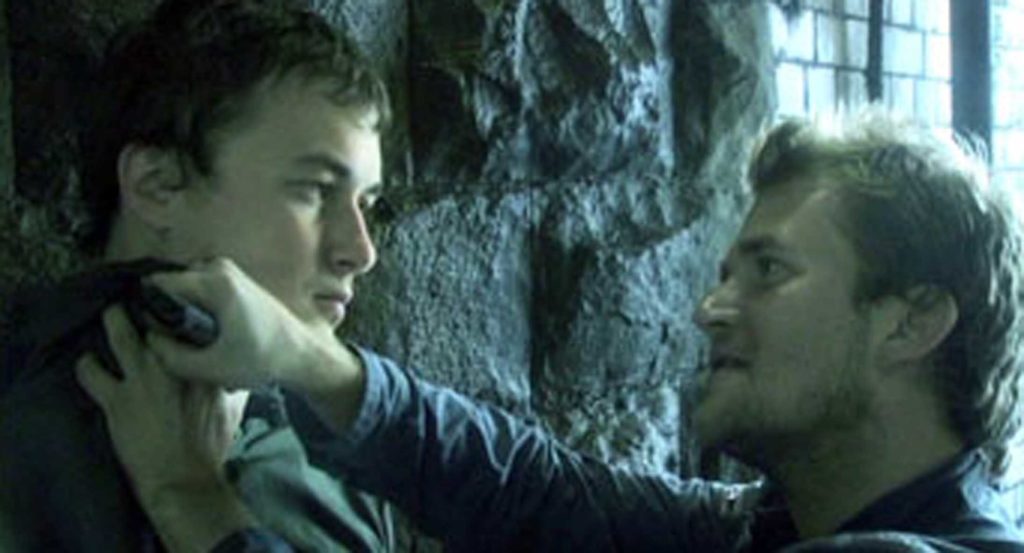
And, look, there’s no point being cruel at length to this indie effort, the debut work by a director in his mid-20s taking time out from his day job, made on a budget maybe somewhere in the five-figure range, that few people saw on release and that only has eyeballs on it now because of where its creator’s career later led. It’s not impossible for a film to transcend those limitations, but for every Clerks or El Mariachi or Primer out there, there are a thousand others where the result is exactly what you’d expect under the circumstances. Footsteps is one of those; an early, floundering effort by an artist to break into their chosen medium, still very much learning as they go. It’s a film you watch not for its own sake, but because it’s an artefact, hoping to exhume its creators’ interests and predilections when they were in their larval state.
The production values are what they are. The image quality is low-res and murky, shot on prosumer equipment with ambivalent focal depth, and light-levels unbalanced in the frame, giving every object a kind of soft-edged, smeary, blurry look. Exteriors are pretty much all in nondescript streets and alleyways in low-rent areas of Cardiff (a single-platform train station, complete with an elevated shot of an arriving train, is about as luxurious as it gets), and interiors are mostly domestic spaces or anonymous offices, with a few brief sequences in a factory floor and one in a bar. A couple of scenes set in what’s supposed to be a hospital room are very obviously a suburban bedroom, where a heart monitor was placed as a prop and the foley guy crossed his fingers and hoped the “beep… beep… beep…” would sell the verisimilitude.
Of particular note are the stunts and makeup effects. Violence is a big part of Footsteps’ plot, and there are multiple scenes where characters are bludgeoned until they’re dripping blood; but the crew have limited means for effects, or injury insurance, so much of the violence has to be strategically hidden in the framing and the blocking. Some of these scenes fare better than others; generally, the instances of violence committed in low light look more convincing. There’s a scene in a nightclub where protagonist Andrew (Nicholas Bool) beats the guy cuckolding him half to death. The darkness of the set, in concert with the cherry-red lighting, makes the moment land; the guy really looks like he’s had his face mashed to a bloody pulp when he lies on the ground, gasping for air. It’s maybe the most effective single scene in the whole film. But then, there are downright risible moments like the early scene where we see Andrew sitting at the train station, his face riddled with bruises, and in the exposure of daylight, he looks like he’s had someone draw on his cheeks and jaw with a purple marker pen.
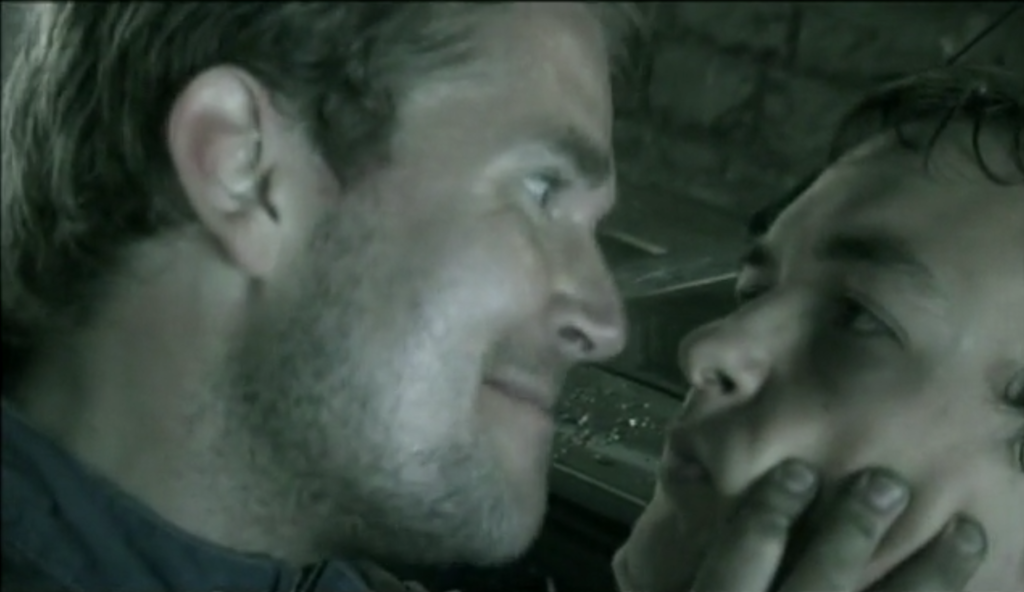
Irrespective of production values, though, Footsteps is a film that’s very clearly been shot and edited with deliberation and intent. Cinematographer Matt Flannery – Evans’s most stalwart collaborator, who’s served as DP on everything he’s ever made – puts a great deal of effort into blocking and staging scenes so that they communicate character dynamics and motivations, and he gets some opportunities to exercise his penchant for bold, primary-coloured, Argento-ish lighting. Evans’s editing adroitly uses cutting rhythms to get us into his protagonist’s headspace. One sequence early on shows Andrew feeding his goldfish before going to bed at night; the shots in this scene are coloured dark blue, and linger for several seconds, appropriate to the sense of peaceful weariness at the end of a long workday. From the shot of Andrew lying in bed, we cut to a shot of an old-school punch-card being clocked in, illuminated in harsh yellow. This shot of the punch-card lasts less than a second, before it’s followed by a shot of Andrew on the bus, headed home at the end of his shift, still illuminated in that same, garish yellow.
This is good shit. It gets across the sense of ennui Andrew feels in his day-to-day life, the workday in his factory job so mundane that its main emotional significance is in how it disrupts his sleep. If I were Gareth Evans’ and Matt Flannery’s professor at Glamorgan University, I’d give them at least a B+ for this sequence.
This much comes across in Footsteps loud and clear: Evans aims to be a visual storyteller. To communicate story, character, and theme, he gives staging, blocking, cutting, and lighting absolute priority over dialogue or exposition. Long stretches of the movie are completely dialogue-free; details like Andrew’s relationship with his late father, his relationship with his girlfriend, his deteriorating mental state and how he falls in with a gang producing snuff films in Cardiff’s back-alleys, these are all left for the audience to infer from the juxtaposition of images. The film goes all-in on “Show, Don’t Tell.”
Footsteps has a very firm sense of the kind of film it wants to be; a bleak, dour arthouse neo-noir, something kin to the work of Nicolas Winding Refn, or a more grounded Takashi Miike (the opening credits, an orgiastic montage of sex, drugs and violence set to loud, throbbing techno, are a very clear nod to the beginning of Miike’s Dead or Alive). Trouble is, it’s just not quite got the execution of that style down. Evans errs too hard towards being elliptical, leaves too much up to implication. The first act, in particular, skates straight past being allusive and ends up downright confusing, jumping around in time and place, arriving at a single plot-point – “Andrew’s father got sick and died young” – by the most squirrelly, circuitous route possible. Things settle down a bit by the time Andrew falls in with the gang led by Jared Morgan’s Cameraman; the chronology becomes much easier to parse, the A-to-B-to-C order of events more concrete. But there’s a sense throughout of needless opacity, that we’re being made to work unduly hard for the “who, what, when, where, and how” of the scenario.
Footsteps has a very firm sense of the kind of film it wants to be; a bleak, dour arthouse neo-noir, something kin to the work of Nicolas Winding Refn, or a more grounded Takashi Miike
For example, there’s a scene where Andrew is talking with a hospital receptionist who describes a patient recovering from grievous injuries. I eventually pieced it together that the patient she’s describing is the man Andrew savagely beat in an earlier scene, as part of his induction into snuff production. But we never see the patient, and he isn’t named; the only character we’ve seen prior to this point in hospital is Andrew’s (also unnamed) father, so that’s who my mind initially went to. And, because the father’s death itself wasn’t explicitly spelled out, my thought process was that I’d misinterpreted the film’s earlier cues; is the father not dead, just comatose? I spent the scene panicking, re-evaluating what I thought had happened in the story like a Sudoku puzzle where I’d arrived at a wrong answer and trying to back-trace my logic, rather than processing the simple emotional point the scene intended: Andrew is feeling remorseful and ambivalent about the path he’s chosen.

The moral of the story is: Show, Don’t Tell is easier said than done. It’s a noble impulse, but it requires a deft hand, and it’s entirely possible for the information you provide audiences to lead them to completely different conclusions than you assume they’ll intuit.
The kicker is, once you’ve untangled it, the story of Footsteps doesn’t have much going on. It’s the tale of a young man who finds himself in a dark place after a run of bad luck; who’s seduced into the company of criminals and sociopaths looking to exploit his pent-up rage and aggression; and who finally turns that rage and aggression back on his exploiters when he realises the depths of depravity they’re capable of, in particular their cruelty towards women. I’d embellish further, but as far as I can tell, that’s sort of all there is to it. Andrew isn’t framed as a mythical, archetypal figure; he’s not the Angry, Lonely Young White Man to stand in for all angry, lonely young white men. But his pain is also too general and too vague; both his joining up with the Cameraman and his subsequent betrayal of the gang feel motivated more by the requirements of the script than any of the characters’ thought processes that the audience has access to.
Nicholas Bool’s performance doesn’t help. I don’t want to pick on the guy sixteen years later, but this is the only role listed on his IMDb profile, and… yeah, that feels about right. Andrew as written is definitely meant to be a cipher, up to a point; he’s an antisocial loner, hollowed out by grief and loneliness and boredom. An actor could potentially make something of that; a character whose emotions are wilfully tamped down and obscured. Bool, though, doesn’t make me feel like Andrew has an inner life he’s deliberately obscuring; he comes across more like an inert lump of clay, a mannequin for Evans to pose from shot to shot.
The moments I most empathised with Andrew are, not surprisingly, the moments he spends in the company of Paul, the cheerfully sociopathic gang enforcer played by Mads Koudal, a Danish actor who already had a respectable CV when filming Footsteps at age 29, and who’s continued to collaborate with Evans up to the present day (he’s the leader of the Danish mercenary group in Gangs of London). They have an honest-to-God character dynamic together. Paul’s insistently chummy questions give us a frame of reference for just how empty Andrew’s life is; Andrew’s restrained, monosyllabic responses give us a straight man, a point of reference for how casual and flippant Paul is about criminality. If only the screenwriter with an MA in screenwriting had more faith in dialogue!
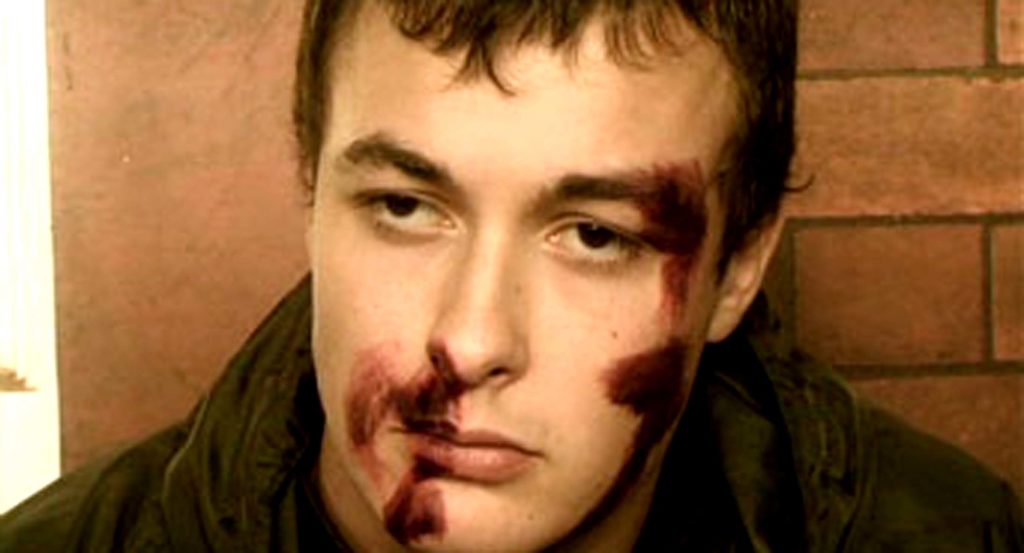
So I don’t ultimately think Footsteps has much to offer as a story – even after you penetrate it, its plot and characterisation are threadbare. Where it does find a measure of success is as a mood piece – it does a very effective job at being sullen, misanthropic, and joyless, and I do honestly mean that as praise. In this regard, the limits of its budget help rather than hinder it. The lo-fi cinematography makes the terminally overcast city of Cardiff look like a thoroughly grey, uninspiring place, anonymous street following anonymous underpass following anonymous row of terraced houses. The cast’s thoroughly unglamorous haircuts and pasty skin-tones complete the vibe of lower-middle-class ennui, of the kind of inertia and frustration that might spur a young man to aimlessly lash out.
…it does a very effective job at being sullen, misanthropic, and joyless, and I do honestly mean that as praise
Add to that the sordid content of the plot – innocent women being forcibly extorted for drug money; random drunks on the street being beaten to near death for the sake of pornographic entertainment – and Footsteps persuasively presents a universe of moral rot and ugliness, with the only potential olive branch being Andrew’s relationship with his estranged girlfriend (the movie’s final shot strikes a note of tentative hope, hinting at a distant possibility of human connection to redeem the nihilistic events of the previous eighty minutes).
The peculiar thing about Gareth Evans – or not, depending on how you feel about transgressive, “extreme” media, generally – is that he comes across as an absolute teddy bear in person. I don’t know the man, and I shouldn’t act as though I do. But in all the interviews I’ve heard him give over the years, he always occurs as a friendly, laid-back, soft-spoken guy; quick to praise his collaborators, compulsively modest about his accomplishments, and geekily enthusiastic about making and watching movies. Gather together a hundred random big blokes from rural Wales, and he’s the last one you’d associate with the image of a broken bottle being pushed into a carotid artery.
And yet, one thread that conspicuously pervades through all his work – a criticism I think that could be fairly levelled at everything he’s made, starting here in Footsteps all the way up through Gangs of London – is an indulgence in grittiness for the sake of grit. There’s a quasi-adolescent fascination there with tough, morally compromised men doing and saying horrible things to one another, and a creative relish being taken in finding new permutations to do and say them. It’s not sadism or cruelty driving this impulse, I don’t think; he regularly presents characters in terms too empathetic for that to be the case. Rather, it’s that teenage boy’s fascination with taboo words and images; a desire to be confronted with them and not flinch, and thereby demonstrate that they’ve mastered them.
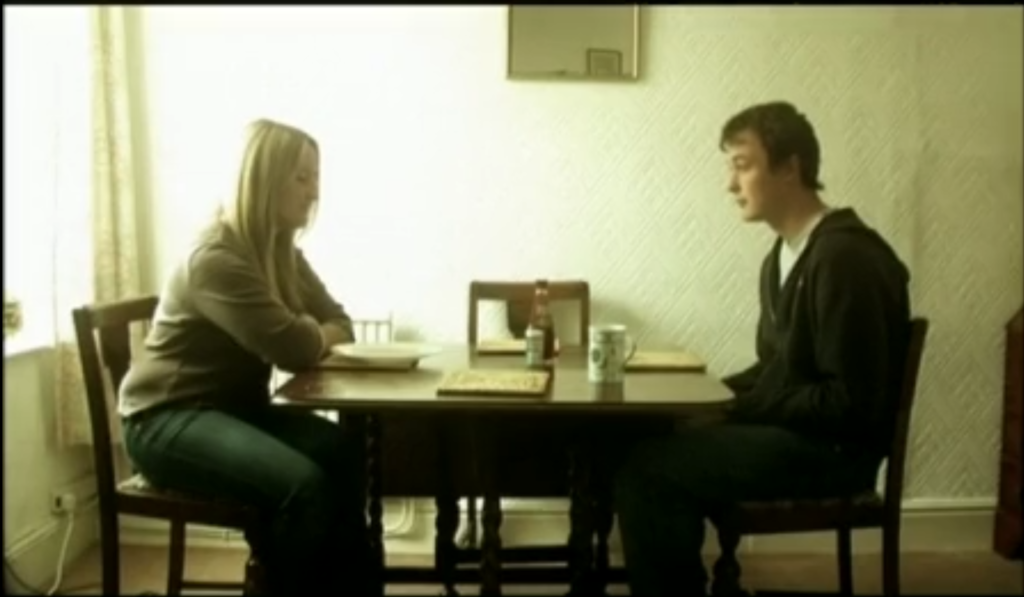
Some boys (and I don’t exempt myself from this) never fully outgrow that impulse. In Evans’ best work, that tendency toward grit and edge is a garnish; it augments his use of other genre tropes; makes his characters’ struggles feel that much harder and more vivid and more urgent; makes his heroes more human, not less.
In Footsteps the grit is there, but not a lot else. Not yet. Evans would need to relocate halfway around the world before he figured out how to alchemise grit into gold.
- Review Series: Gareth Evans
Is It Good?
Not Very Good (3/8)
Andrew is a 2012 graduate of the University of Dundee, with an MA in English and Politics. He spent a lot of time at Uni watching decadently nerdy movies with his pals, and decided that would be his identity moving forward. He awards an extra point on The Goods ranking scale to any film featuring robots or martial arts. He also dabbles in writing fiction, which is assuredly lousy with robots and martial arts.

